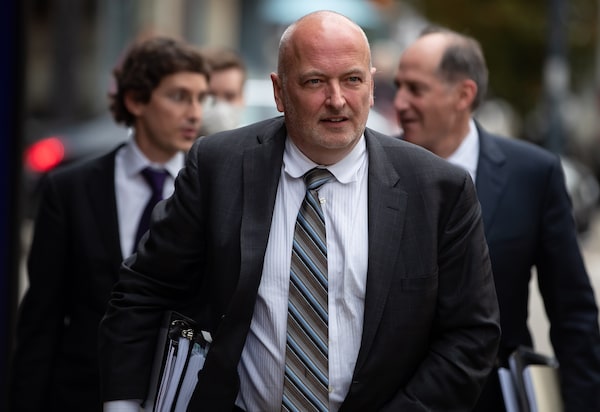
Lawyer Ken McEwan, who is representing former Rogers Communications chairman Edward Rogers, walks back to B.C. Supreme Court after a lunch break, in Vancouver, B.C., Nov. 1, 2021.DARRYL DYCK/The Canadian Press
Lawyers for Edward Rogers went up against Rogers Communications Inc. in a Vancouver courtroom on Monday to settle a bitter dispute over whether B.C. law allows Mr. Rogers to change the board of Canada’s biggest wireless carrier without a shareholder meeting.
Mr. Rogers is aiming to win court approval of his recent move to replace five independent directors with his own slate and be reappointed as chair of the telecom and media giant’s board. The process that the company’s lawyers argued is required would likely take months.
The case has drawn hundreds of pages of court filings containing conflicting versions of the events leading up to the ongoing boardroom brawl, opposing views on the leadership of Rogers chief executive officer Joe Natale and varying interpretations of the wishes of the company’s late founder, Ted Rogers.
But Ken McEwan, one of the lawyers representing Mr. Rogers, said those considerations should not determine the case. Instead, he argued, the outcome hinges on a “simple and narrow question”: whether B.C. law permits Mr. Rogers, as the company’s controlling shareholder, to reconstitute the board through what is known as a consent resolution. (As chair of the Rogers Control Trust, Mr. Rogers, the son of the company’s late founder, has the authority to vote 97.5 per cent of company’s voting class A shares.)
Mr. McEwan said on Monday that the B.C. Business Corporations Act is unique in allowing such a change to be made using this method. (Although Rogers has its headquarters in Toronto, the company is incorporated in British Columbia.)
“We are here as a shareholder exercising clear shareholder rights,” Mr. McEwan said.
B.C. Supreme Court Justice Shelley Fitzpatrick, after hearing a full day of arguments, said she plans to issue a decision on Friday afternoon.
CRTC urged to delay hearing over Rogers’ planned acquisition of Shaw due to company uncertainty
Governance issues loom large in Rogers court ruling
Lawyers representing Rogers Communications, meanwhile, argue that making the kind of changes Mr. Rogers is proposing requires him to hold a shareholder meeting – even though the class B shares held by minority shareholders don’t come with voting power.
Such a meeting would provide more time for public discourse regarding Mr. Rogers’s plans and give minority shareholders the chance to vote through buying or selling stock, they said.
Stephen Schachter and David Conklin cited the company’s publicly disclosed governance practices, its articles of incorporation and a memorandum of Ted’s wishes to make their case.
“When you’re changing five independent directors, effectively changing control at the board level, it is, we would submit, a fundamental change to the company,” Mr. Conklin said. “It’s a change that shareholders and stakeholders have a direct interest in, and a right to be fully informed about. It is not a private company.”
Mr. Schachter urged the judge to reject Mr. Rogers’s position that the province’s corporate law allows him to do “whatever he wants on whatever terms he wishes.”
The weeks-long boardroom and family drama at Rogers Communications erupted after Mr. Rogers attempted to replace Mr. Natale with the company’s then-chief financial officer, Tony Staffieri. The move met resistance from other Rogers family members and the majority of the company’s board, and Mr. Staffieri exited the company instead.
A former board chair at Rogers has criticized Mr. Rogers’s attempt to reconstitute the board through a consent resolution, noting that Rogers is a public company with a broad base of shareholders, operates in a regulated field and has an obligation to act as a good corporate citizen.
Garfield Emerson, a former securities lawyer experienced in corporate governance issues who was chair of the Rogers board from 1993 to 2006, said in an affidavit dated Oct. 29 that shareholders should have “an opportunity to participate in the process” through a shareholder meeting.
Doing so ensures transparency and accountability for the change in control of a public company, he said, by recognizing shareholders’ rights to ask questions and raise concerns with such decisions.
“In my opinion, the Rogers Control Trust’s use of a written consent resolution unilaterally to reconstitute the membership of the RCI board, a large Canadian public company, without a duly called and properly constituted general meeting … is unique and unparalleled in the corporate governance of large Canadian publicly traded corporations,” Mr. Emerson said in the affidavit, adding that it is “in open and direct conflict with the best corporate governance practices of large Canadian public corporations.”
Rogers’ class B shares closed up 88 cents, or 1.5 per cent, to $58.44 on the Toronto Stock Exchange on Monday.
Your time is valuable. Have the Top Business Headlines newsletter conveniently delivered to your inbox in the morning or evening. Sign up today.
 Alexandra Posadzki
Alexandra Posadzki Susan Krashinsky Robertson
Susan Krashinsky Robertson Brent Jang
Brent Jang